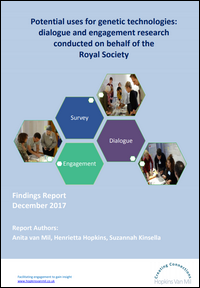
The Royal Society Report Says UK Public Cautiously Optimistic about Genetic Technologies
April 4, 2018| |

In a survey of 2,061 people, 46% indicated that they agreed with the statement that ‘genome editing in general carries too many risks to be used to tackle global challenges', and the public is very positive about its use in specific areas such as human health. There is support for using genome editing in plants to produce cheaper medicines (69%), make crops more nutritious as a way of supplementing poor diets (70%), and to prevent crop damage, for example by fungal diseases (77%).
There is also support for the use of genome editing in animals to prevent or cure human disease. For example, 71% of survey participants approve of using genetically modified mosquitoes to limit the spread of malaria.
About 43% of survey respondents ranked university academics, scientists and researchers as the most trustworthy to provide information and advice about genetic technologies. This view was backed up by participants in the survey's accompanying workshops, who saw this group as having greater impartiality. Businesses working on or funding research on genetic technologies ranked as the second most trusted (16%), closely followed by government bodies/policy makers (14%), and regulatory organizations (12%).
For more, read the news article in The Royal Society website.
| |
Biotech Updates is a weekly newsletter of ISAAA, a not-for-profit organization. It is distributed for free to over 22,000 subscribers worldwide to inform them about the key developments in biosciences, especially in biotechnology. Your support will help us in our mission to feed the world with knowledge. You can help by donating as little as $10.
-
See more articles:
-
News from Around the World
- Agribiotech Can Unlock Business Opportunities in Africa
- High Hopes as Uganda's Biotech Bill Gets 'Second Chance'
- Scientists Publish Additional Soybean Reference Genomes
- Australian Vine Helps Boost Soybean Yield
- CAS Researchers Discover Evidence of the Beginning Rice Cultivation
- USDA FAS-GAIN Reports Agri-biotech Updates in Pakistan
- Genome Archaeologists Uncover Origin of Plant Hormone Auxin
- The Royal Society Report Says UK Public Cautiously Optimistic about Genetic Technologies
-
Research Highlights
- Sugar Transporters in Tea Plants Also Involved in Plant Response to Stresses
- GhPEPC2 Gene Regulates Seed Oil Accumulation in Cotton
- Researchers Find Gene Regulating Plant Growth and Pest Resistance in Rice
-
Beyond Crop Biotech
- Engineering Yeast to Make Non-Narcotic Cough Suppressant
- Animal Scientist Highlights Role of Genetic Modification in Livestock Health, Growth and Well-being
-
Announcements
- 2018 IPBO Conference
-
Plant
- Researchers Study Morphological Impact of ERECTA Genes in Rice Using CRISPR
- Gene Promoter Used to Optimize CRISPR for Targeted Genome Editing in Maize
- Chinese Scientists Perform Gene Replacement in Rice
- US Agriculture Secretary Issues USDA Statement on Plant Breeding Innovation
-
Read the latest: - Biotech Updates (January 21, 2026)
- Gene Editing Supplement (January 28, 2026)
- Gene Drive Supplement (February 22, 2023)
-
Subscribe to BU: - Share
- Tweet
